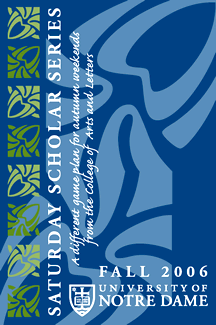
The sixth annual Saturday Scholar Series at the University of Notre Dame will feature six lectures and a performance by leading faculty members on each home football game weekend this fall.
Sponsored by the College of Arts and Letters, the lectures were initiated by Mark W. Roche, I.A. O’Shaughnessy Dean of the college, to add a scholarly dimension to a weekend roster of athletics, pageantry and fine arts performances.
The lectures will begin three and one-half hours before kickoff and take place in the Annenberg Auditorium of the Snite Museum of Art, unless otherwise noted. They are as follows:
- *Sept. 9 – * “More Than a Movie? Assessing ‘The Da Vinci Code’” (DeBartolo Hall, Room 101). This panel presentation will offer insights into the cinematic quality of the blockbuster film, the historical relationship between Jesus and Mary Magdalene, and the theological role of the art depicted in the movie. The panelists will be James Collins, professor of film, television and theatre; Mary Rose D’Angelo, associate professor of theology; and Charles Barber, associate professor of art, art history and design.
- *Sept. 16 – * “The Impact of the Dead Sea Scrolls on Our Bible,” with Eugene Ulrich, Rev. John A. O’Brien Professor of Theology. Discovered between 1947 and 1956, the Dead Sea Scrolls include approximately 240 Hebrew and Greek biblical manuscripts that illuminate a previously undocumented period in the history of the books of the Bible. This lecture will examine how these manuscripts illustrate the development of the biblical books and raise questions about revelation, inspiration, and the canon.
- Sept. 30 – " Successful Aging," with Cindy Bergeman, chair and professor of psychology. Why do some people manage to maintain good physical health and a positive outlook on life as they age, while others — under the same conditions — get sick or lose hope? How do these qualities develop and change across the life course? Bergeman will explore the psychosocial attributes that promote stress resistance and resiliency in later life, and the factors and processes that lead to more optimal outcomes.
- *Oct. 7 – * “The Bone Collector,” with Susan Guise Sheridan, associate professor of anthropology. Gain insight into the lives of ancient populations of the Middle East – how they lived, what they ate, from what diseases they suffered, how they died – through an examination of their bones. Sheridan, who specializes in forensic and cultural anthropology, analyzes ancient bones and pieces together biological clues to better understand the lives of those populations.
- *Oct. 21 – * “Completing the Constitution: The 14th Amendment,” with Michael Zuckert, Nancy Reeves Dreux Professor of Political Science. Few realize that James Madison, the “father” of the U.S. Constitution, thought his handiwork lacked features essential to its success. After the Civil War, Congress came to a similar conclusion and addressed a number of Madison’s original concerns in the 14th Amendment. This lecture will discuss how the idea of “completing the Constitution” provides the key to understanding this most important but controversial addition.
- *Nov. 4 – * “The Role of Religion in Peacebuilding,” with panelists R. Scott Appleby, professor of history and the John M. Regan Jr. Director of the Joan B. Kroc Institute for International Peace Studies; John Paul Lederach, professor of international peacebuilding; and A. Rashied Omar, assistant professor of Islamic studies and peacebuilding. The panel will explore the constructive achievements of religiously inspired peace builders, and what those religious actors have done in the past to stimulate the peacebuilding capacity of people suffering in conflicts. The panel also will discuss the role of Notre Dame’s Kroc Institute in supporting and promoting peace around the world.
- *Nov. 18 – * “Seeds of Change,” a musical performance, with music department faculty members Georgine Resick (soprano) and John Blacklow (piano). “Seeds of Change,” a program of French music from the first half of the 19th century, includes works by Berlioz, Chopin, Liszt, Gounod, and Saint-Sens, as well as spoken commentary drawing parallels between the music of the period and concurrent trends in literature, the visual arts, social history and politics.
Originally published by at newsinfo.nd.edu on August 18, 2006.